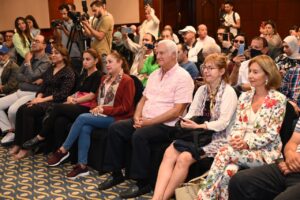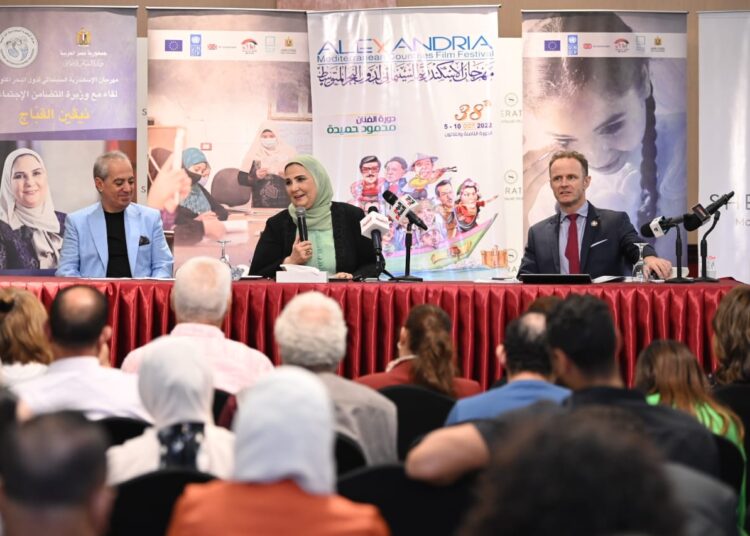Egypt’s Minister of Social Solidarity Nevine el-Qabbag announced three awards for the best films produced by civil society organisations or independent filmmakers documenting community initiatives that have improved people’s lives in local communities.
The minister made the announcement during the symposium ‘Cinema, Raising Community Awareness, Building Persons and Development Issues’ at the Alexandria Film Festival for Mediterranean Countries.
“The ministry has adopted an observatory to watch movies and series to monitor the works that deal with the social issues of interest to the ministry,” el-Qabbag said.
Many films also contribute to promoting the services provided by the ministry, especially for women and children in families with priority in care, which increase demand for these services, or attract volunteers and donations to develop its resources and improve its services, and then develop them to the highest possible quality to respond to the real needs of the Egyptian citizen, in particular those who are most worthy of care, el- Qabbag said.
“Egypt is one of the first countries that established a film industry since the beginning of the last century. Egyptians cherish this industry as one of the most important forms of soft power in Egypt, and indeed in the Arab region,” El-Qabbag added.

Cinema and drama have a strong influence in shaping the collective thought and conscience of the Egyptian and Arab audience, and many of the principles, values, customs and traditions of Egypt are transmitted through these screens.
However, with the progress of time, we have found some works that may reflect negative thoughts and behaviours, affecting young people, which in turn affect the progress or impede the development of minds, and social and economic development.
Hence comes the great interest of the Ministry of Social Solidarity, and indeed its great sense of responsibility towards contributing to the dissemination of constructive societal culture, including building a healthy family and respecting the relationship between women and men, positive education for children and evaluating their behaviour, enhancing women’s value, raising awareness of the dangers of addiction, respecting the capabilities of handicapped people, considering the right of the neighbour, encouraging community service, combating all forms of violence and abuse, enhancing the value of work, raising feelings of citizenship, and raising the value of the nation.
The Minister of Social Solidarity explained that Egyptian cinema, with its long history, has remained present in documenting the life, experiences and problems of Egyptian society.
Some films such as Ga’alony Mugriman (They made me a criminal), Ayn Omry? (Where is my life?), Oreed halan (I want a solution), Afwah w- Aranib (Mouths and Rabbits), Al-Rusasa la tazal fi-geeby (The bullet is still in my pocket), have succeeded in making a qualitative leap in the awareness of Egyptian and Arab audience about their issues and in changing legislation and laws.
The Ministry of Social Solidarity participates in the festival with three films, Our Sweet Country, which discusses the issue of Egyptian citizenship values and respect for diversity against extremism and religious and social extremism in areas that have suffered from extremism and terrorist events in Upper Egypt, and the role of NGOs in partnership with the Ministry of Social Solidarity in creating civic spaces, that includes all citizens under the slogan “We are all Egyptians…our diversity is strength”.
The festival also screens the movie Knowledge is Light that presents a model for integrating public service officials in implementing literacy classes for families with the most care in Hayat Kareema (Decent Life) villages, while integrating awareness programme messages into the curricula used in those classes.
And the third movie is Point and From the Beginning of the Line, which presents a special docudrama about early marriage and its dangers to the girl’s health, physical and social life.
El-Qabbag highlighted the ministry’s programme Wa’i (Awareness) for community development that is considered to be the link for media and cultural communication between the ministry and citizens on various social issues.
Wa’i programme includes topics such as children marriage, female genital mutilation, health issues, education, handicapped people’ rights and economic empowerment of poor and marginalised families to take them from protection stage to production.
Through the Wa’i programme for community development, a comprehensive and unified approach has been prepared to address all social protection issues addressed by the Ministry of Social Solidarity, targeting families enrolled within the Takaful and Karama social protection programme.
The symposium was attended by Amir Abaza, President of the Alexandria Film Festival for Mediterranean Countries, Sylvain Marlin, Deputy Representative of the United Nations Development Programme, a group of artists, drama writers, directors and producers of cinema and drama works, critics and senior writers, members of the committee for selecting the best social dramas for the year 2021/2022, and the international partner institutions ‘European Union – British Embassy – United Nations Development Program’ representatives of civil society organisations in the Wa’i programme for community development.






Discussion about this post